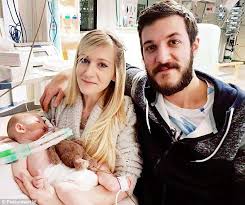Charlie Gard
 Aristotle wrote in his Ethics that the end purpose of philosophy is purposeful action. Disciplined thinking is essential to living well, deciding what action to take. And since to be human is to be a social creature, we make innumerable decisions that materially affect the lives of others.
Aristotle wrote in his Ethics that the end purpose of philosophy is purposeful action. Disciplined thinking is essential to living well, deciding what action to take. And since to be human is to be a social creature, we make innumerable decisions that materially affect the lives of others.
A group of us met last night to consider the dilemma of Charlie Gard, and his parents Connie Yates and Chris Gard. Charlie is a eight month old infant suffering from a mitochondrial deficiency disease. His mitochondria do not supply the energy that his cells need to grow, in the manner of healthy infants. Charlie is kept alive by a respirator and has suffered brain damage.
I’ve considered case studies before in order to explore the ethical dimensions of the circumstances and the suffering that is the lot of someone else. I had just enough information about Charlie’s situation, and that of the hospital that has cared for him to this point–to be reminded of my three grand children. The grand daughter is not that much older than Charlie. If a similar catastrophe were to strike any of the three, I am certain that it would be some time before I could utter a complete sentence of any kind. The grief and the felt loss would be crushing. So, at a remove I do understand, what Charlie’s parents must be suffering. For parents, the child is an extension of two selves, and grounds for believing that in this child the best of their heritage will be carried forward. Perhaps this is unrealistic. Happy endings are rare. But it is absolutely natural to hope for, to envision a new world in the child.
So, there is a place for the “egoism” expressed in the parents plea that their son “deserves a chance.” It seems barbaric to analyze, to deconstruct their expressions of unconditional solicitude for their dying child.
On the other hand, and there is always “the other hand,” Doctors and research clinicians representing the hospital affirm that the chances of a positive outcome from additional therapy are negligible. Judicial authorities have supported the hospitals position thus far. Under the laws of the UK, Great Ormond Street Hospital For Children declines to allow further treatment of the dying child.
To state plainly my thinking at the end our session of spirited discussion: I think that the parents and the hospital are right. Both points of view have weight, merit respect My spirit bowed at the realization that in any case, Charlie Gard will soon pass from this world. Though Charlie’s denouement was tragic and brief, he was loved extraordinarily by his parents, and by a community of Doctors and nurses. Others have not been as fortunate, even if they have lived longer.
I was also reminded of the tantalizing offer made to our mythical mother Eve in the Genesis story. The challenge was laid down to cross the moral event-horizon, ….“your eyes will be opened, and you will be like God, knowing good and evil.” Who would not desire to be like a god, to wield ultimate knowledge, to perceive the good and the evil with the certainty of a god?
The story of Charlie Gard shows the torment that attends making a life or death decision, to wield the sharp blade of life and death, good and evil on behalf of a small child. Yet this is what it means to be human, to be a meaning maker, to create indescribable beauty or to destroy and leave unspeakable devastation. To act, is to create, to be as a god.
I have entitled this post with Charlie Gard’s name. It is manifestly right that he be remembered.
A further late word:
Charlie Gard has reportedly been granted permanent residence in the US so he can travel to America to receive experimental treatment. The decision by US Congress may oblige Great Ormond Street Hospital to release the sick baby so he can receive nucleoside therapy.